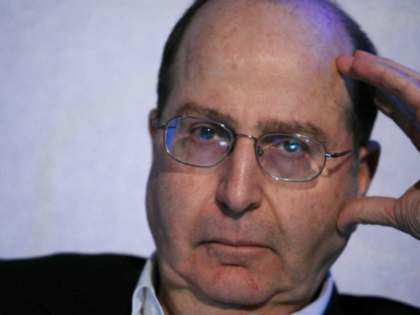Earlier this week, Israeli Defence Minister Moshe Ya’alon made comments ripping into the Obama administration for projecting dangerous weakness in American foreign policy. The next day, Washington ripped right back into Ya’alon for undermining the U.S.-Israel relationship.
Was either side justified in its criticism? Were both?
Ya’alon made an assortment of critical assessments of American foreign policy in an address at Tel Aviv University. He said the United States “shows weakness” in various arenas around the world, and that American allies are disappointed. “I heard voices of disappointment in the [Middle East] region. I was in Singapore and heard disappointment about China getting stronger and the U.S. getting weaker. Look what’s happening in Ukraine, where the United States is demonstrating weakness, unfortunately,” Ya’alon said.
Ya’alon issued a sharp critique of Washington’s attitude toward Iran, suggesting President Barack Obama would prefer to delay any confrontation until it could be passed on to his successor. “People know that Iran cheats,” Ya’alon said. “But comfortable Westerners prefer to put off confrontation – if possible, to next year, or the next president. But in the end, it will blow up.” Ya’alon dismissed the possibility that America would act militarily against Iran, saying Israel must “behave as though we have nobody to look out for us but ourselves.”
The Obama administration pushed back immediately. “We were shocked by Moshe Ya’alon’s comments, which seriously call into question his commitment to Israel’s relationship with the United States,” a senior administration official said. “Moreover, this is part of a disturbing pattern in which the defence minister disparages the U.S. administration, and insults its most senior officials. Given the unprecedented commitment that this administration has made to Israel’s security, we are mystified why the defence minister seems intent on undermining the relationship.”
The anger with Ya’alon for his comments was compounded by previous off-the record comments he made in January which were leaked in which he mused that U.S. Secretary of State John Kerry had a “messianic obsession” with forcing the Israeli-Palestinian peace process forward.
The administration’s outburst was among the harshest statements ever against an Israeli minister. And Ya’alon is not just any minister: he is a high-ranking member of the Likud party, a trusted ally of Prime Minister Netanyahu, a popular former Chief of Staff of the Israel Defense Forces, and has a reputation for honesty and straight talk. He is considered a strong future contender to become prime minister.
Ya’alon and Netanyahu both issued apologies later in the week, smoothing over ruffled American feathers, at least for the time being.
Was Ya’alon wrong?
Certainly not in substance. It is no secret that the Sunni Arab states are irate with the White House for a host of reasons, including Obama’s erasable “red line” in Syria and his accommodationist attitude toward Iran.
And the rest of America’s allies are alarmed at U.S. inaction and perceived weakness in dealing with Vladimir Putin’s Russia. What happens in Ukraine doesn’t stay in Ukraine; the Crimean episode may appear to America to be about Russia, but to the rest of the world, it is at least as much about America’s non-response to Putin’s aggression. The Chinese and Taiwanese have taken notice. As have the North and South Koreans. As have the Russians and the rest of the former Soviet Republics and captive nations. As have the Iranians, the Arabs and the Israelis.
Israel is particularly aghast at America’s see-no-evil engagement with Iran. America proceeds with farcical negotiations with the Iranians even though Iran is the primary force sowing terrorism and chaos throughout the Middle East. It is behind most of the slaughter in Syria.
Just weeks ago, Israel intercepted a ship, the Klos C, with a cargo of sophisticated Iranian weapons destined for Iranian proxy armies terrorising Israel. Just days ago, those same Iranian proxies fired dozens of rockets at Israel. Was there even a word of serious American protest to the Iranians? Did it even slightly alter the American negotiating posture?
Worst of all is the interim nuclear deal with Iran signed in Geneva last November. It allows Iran to continue to enrich uranium, erasing another American red line. It makes no mention of Iranian support for terror or human rights abuses. It is silent about the development of Iranian intercontinental ballistic missiles. It permits construction to remain on course at the Arak heavy water reactor, necessary solely for the production of plutonium weapons. Its inspection provisions are not serious. The Iranians justifiably praised the deal as “surrender” by the West.
Ya’alon’s characterisation of American weakness is not only justified, but he is hardly the first to use the term to describe Obama’s foreign policy. What he said is in line with the thinking of a solid majority of Israelis–and, most likely, of Americans, too. It is hard to argue that such American weakness does not erode both American and Israeli security. In fact, he likely drew such a harsh response from Washington because what he said had the ring of truth to it.
And yet, it was a mistake to say it. Ya’alon is not just any former general or think tank scholar who can say whatever is on his mind. He is a cabinet minister, part of a larger government. Israel’s relationship with America is an asset of the entire country, not something to be squandered at the impolitic whim of any politician. It is simply not his job to publicly tell off Israel’s most consistent ally.
No matter how much truth he speaks.

COMMENTS
Please let us know if you're having issues with commenting.